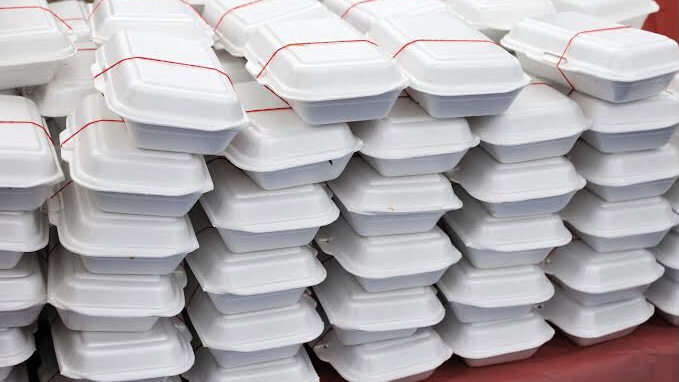Styrofoam, also known as polystyrene, is a type of plastic that is widely used for food packaging, insulation, and other purposes and non-biodegradable plastics are widely used in many developing economies like Nigeria. Styrofoam and non-biodegradable plastics are cheap, lightweight, and durable. They can reduce the cost of transportation and storage of goods and protect them from damage and spoilage but, they also pose some environmental and health challenges.
It is agreed that Styrofoam and non-biodegradable plastics can provide thermal insulation and prevent heat loss or gain. This can save energy and improve the quality of food and beverages and with technology they can be recycled and reused for other applications, such as building materials, furniture, and art. This recycling can create jobs and income for the local communities.
However, Styrofoam and non-biodegradable plastics can take hundreds of years to decompose in landfills, where they occupy a large amount of space and release greenhouse gases. They can also contaminate the soil and groundwater with toxic chemicals. They can litter the environment and harm wildlife and marine life. They can be ingested by animals or entangled them, causing injury or death. They can also degrade into microplastics, which can enter the food chain and affect human health.
Styrofoam and non-biodegradable plastics can leach styrene and other substances into food and drinks, especially under high heat. Styrene is a possible carcinogen and a neurotoxin that can cause headaches, nausea, and fatigue.
- Name sponsors of terrorism, Sharia Council tells EFCC
- INEC suspends officer over ‘missing’ ballot papers in Plateau
Other associated substances can also disrupt the hormonal system and cause reproductive problems. Considering that Styrofoam and non-biodegradable plastics are made from fossil fuels and require a lot of energy to produce and transport, they contribute to greenhouse gas emissions and climate change.
It is thus a welcome development that the Lagos and Abia state governments recently announced a ban on single-use plastics, including Styrofoam to curb environmental degradation caused by plastic pollution.
The ban is a step in the right direction towards a healthier future and incentivizes innovation and the adoption of sustainable alternatives. Styrofoam and single-use plastics have posed a threat to human health as hazardous plastic polymers have been found in potable water and food.
It will be a step in the right direction if the ban on the use of these substances is carried out nationwide considering the fact that Styrofoam and non-biodegradable plastics can persist in the environment for hundreds of years, clogging waterways, polluting soil, and harming wildlife; they can release toxic chemicals when exposed to heat, sunlight, or acids that can contaminate food and water and cause health problems such as cancer, respiratory irritation and nervous system damage. They can break down into microplastics – tiny pieces of plastic that can be ingested by animals and humans and can accumulate in the body and interfere with hormonal functions.
There are already some government policies on plastic waste management in Nigeria. According to a report by the Federal Ministry of Environment, Nigeria has developed a National Policy on Plastic Lifecycle Management, which aims to drive resource efficiency, cleaner production and environmental protection in the plastic sector. The policy also aligns with some of the Sustainable Development Goals, such as responsible consumption and production, and life below water.
But, implementing these policies poses challenges due to lack of data and statistics, low awareness and education, inadequate infrastructure and facilities, weak enforcement and compliance. Therefore, there is a need for more political will and institutional capacity to ensure effective governance and accountability in the plastic sector.
With the existing policies, the Federal Ministry of Environment should encourage the states and drive the campaign for a cleaner environment through the banning or regulating the use of styrofoam and single-use plastics, as some other African countries have done, promote the use of alternative materials, such as paper, cardboard, bamboo, or bioplastics that are biodegradable and eco-friendly, educate the public and raise awareness about the negative impacts of styrofoam and the benefits of recycling and reusing, support the development of local industries and initiatives that can collect, process, and recycle styrofoam and other plastic waste.
Policy should also address the challenges of recycling plastic bags as there are not many formal facilities or programs for collecting and processing them. However, there are some informal and local initiatives that can support to reduce plastic waste and earn entrepreneurs some income. Here are some possible ways to recycle plastic bags in Nigeria:
Join a waste exchange programme: offer incentives for people to collect and exchange plastic waste for cash, household items or other rewards. People should be made to register and get a collection bin or bag to store collected plastic bags and other recyclables.
Sell to local recyclers: collected plastic bags are sold directly to local recyclers, who buy them at a low price and convert them into reusable products, such as pots, cookware, or furniture. Recyclers are found in junkyards or markets where they sort and process plastic waste.
Make own products: encourage the use of creativity and skills to make products from plastic bags, such as mats, baskets, bags, or jewelry. Teach techniques such as weaving, crocheting, or melting to transform the plastic bags into new and useful items. They can be used personally or sold to others.
Reduce and reuse: The best way to recycle plastic bags is to avoid using them in the first place or to reuse them as much as possible. Encourage the use of reusable bags when you go shopping, or use alternative materials, such as paper, cloth, or bamboo. Advocate for the reuse of plastic bags for other purposes, such as lining trash bins, storing items, or covering plants.
We can learn from countries like Rwanda how they made it work to tag Kigali as the most beautiful city in Africa.
Ahmad resides at FMA2, off Yaya (Petel) Abubakar Road, Fadamar Mada, Bauchi
Email: [email protected]




